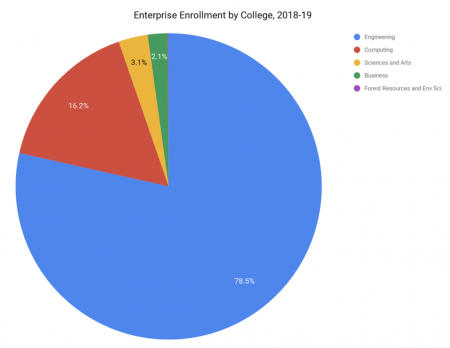
By Rick Berkey, Professor of Practice and Enterprise Program Director
This Fall, the Enterprise Program began its 20th year of operation — a significant milestone for any program, and even more so for one that has been financially self-sustaining since the initial NSF grant ended in 2002. In 2006, I left a successful industry career to manage annual fundraising and sponsorship needs for the Enterprise and Senior Design Programs. Looking back on my decision to work for Michigan Tech, Enterprise was a huge and deciding factor. I was motivated by the opportunity to support students in an educational program that:
- looks more like the interdisciplinary work environment students are heading towards,
- connects students with project sponsors and mentors to solve open-ended, industry-relevant challenges, and
- gives students ownership of a portion of their education that aligns with their personal development and career interests.
Fourteen years later, I am fortunate to direct the program, in addition to teaching Enterprise courses and advising the Supermileage Systems Enterprise. I am just as motivated now as I was in 2006 to be part of what has become an award-winning program that remains quite unique when compared with other programs across the country. Enterprise was, and still is, ahead of the curve in preparing students for successful careers. While we can (and should!) pause briefly to celebrate our important milestone, it’s really time to forge ahead to keep our graduates out in front. So with that, will Enterprise look like in the next 20 years?
First off, I would like to start with what will not change: Enterprise will continue to be student-led, with support and mentorship from faculty, staff, and industry. When students are empowered in an active learning environment, we shift the focus from ‘satisfying degree requirements’ to ‘satisfying curiosity’. Enterprise will remain a multi-year program, where students create their unique pathway through a cycle of experience, reflection, and growth. This also allows enterprise to build a sense of community and be part of something bigger during their time at Michigan Tech; I really enjoy hearing alumni introduce themselves first by their Enterprise, and then by their major. Speaking of majors, Enterprise must and will remain focused on multi/interdisciplinary, team-based problem solving. Why? Because this is how the world operates, whether working in the public or private sector. Finally, industry partners will continue to play a critical role in the Enterprise Program. After all, the best way to continue preparing students for early career success is by partnering with the very organizations seeking to hire them upon graduation.
So, how might we build on this foundation to adapt and evolve the Enterprise Program so that it continues to meet the needs of its graduates and those who employ them? Here are some thoughts and ideas for the next two decades:

- Agility: Cross-enterprise collaboration – if we think of the Enterprise Program as a network, each enterprise is a node with valuable assets, capabilities, resources, and motivations. What if we harnessed this potential more seamlessly and to a greater extent? Imagine multiple enterprises collaborating to address larger-scale “wicked problems” such as NAE’s Grand Challenges. Or, a more agile approach to assembling project teams of varying duration, across enterprises, leveraging complementary skill sets. This year certainly reminds us of the need to be flexible, adaptable, and resilient. We have had successes already with ‘joint ventures’ between enterprises, and the potential to expand on this idea will enhance the Enterprise experience for our students and project stakeholders.

- Inclusivity: Enterprise options for ALL undergraduate majors – from the outset, Enterprise has been open to all majors and annually attracts ~900 students from 30+ majors. Yet, the majority of student enrollment is from the colleges of engineering and computing (see chart). Two factors strongly influence Enterprise enrollment: 1.) degree programs that include a defined Enterprise pathway option for their students, and 2.) the attractiveness of the Enterprise team and project ‘portfolio’ to students. Progress continues on both fronts, with a goal to attract a broader slice of Michigan Tech’s student population each year.
- Value Creation: Fostering innovation and entrepreneurial mindset – in terms of industry-sponsored projects, Enterprise students get first-hand experience delivering an innovative solution of value to a client. As part of the scope, they may even do sponsor-guided market research and economic analysis to help quantify the value for the sponsor’s client. But, we have many enterprises also working on their own innovations, without an external sponsor. Often, these are the projects where student motivation is highest — working on something they are truly passionate about. Some could turn out to be the “next big thing”, and students may even wish to start an eventual business around the idea. The potential to enhance student-initiated project experiences with more support — educationally, financially, and programmatically — will be a focus for the coming years, working closely with colleagues in Husky Innovate and our broader innovation ecosystem.
These are some major initiatives we’re working on, so stay tuned for updates in the coming months. We welcome alumni and industry input in these plans, so please get in touch! As the saying goes, “the only constant is change”, and the ability to embrace, respond, and adapt to change is what will differentiate our graduates going forward. We need only look to our current COVID-19 environment for motivation. But rather than focusing on getting back to normal, our focus is on getting back to better…a better Enterprise Program, a better Michigan Tech, and a better future, created by Huskies!